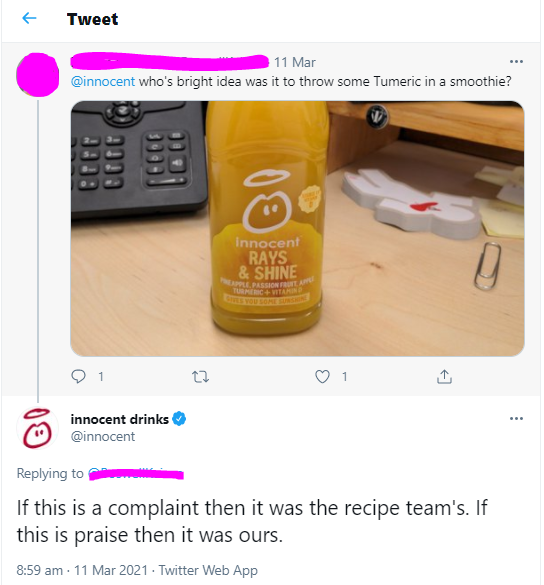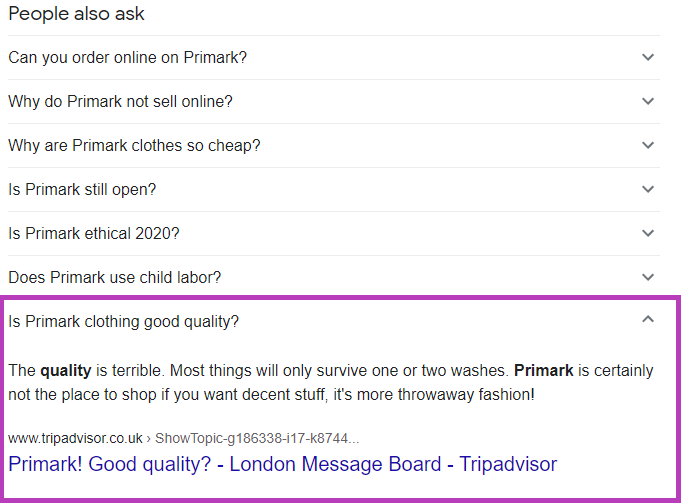Online reputation management (ORM) is not only essential for ensuring your visibility on the SERPs, but for maintaining a positive relationship with your customers.
What is online reputation management in digital marketing?
Online reputation management refers to the monitoring and management of your business’s online presence; this includes managing social media channels and responding to online reviews. Essentially, online reputation management requires you to look at your business’s digital presence from a consumer’s perspective, looking at how users will find out about your brand, staff, products and services when searching online.
If you notice any negative conversations surrounding your brand, you can then address them - for example, if a customer has taken to Twitter to share a negative experience with your company, you can reply to them to try and rectify the situation. Ignoring negative comments about your brand can be damaging and responding aggressively could amplify the issue. Effective online reputation management will allow you to take control of the online conversation and help to build trust with your customers.
In this article, we will discuss why your online reputation is so important for the success of your business and provide tips on how you can improve your online image.
Why is digital reputation important?
Digital reputation is incredibly important because a social media post or negative review could be the first thing a potential customer sees online (and you don’t want them to be put off from approaching you!)
In terms of search engine optimisation (SEO), your reputation is a critical contributing ranking factor. In other words, if your website doesn’t have a healthy reputation, it’s not going to outrank your competitors who are being proactive with their online reputation management. SEO helps you to build a strong online presence, ensuring that your website is visible to users, driving more traffic and helping to increase leads and sales.
If you can demonstrate a great customer care service through prompt and friendly responses in your online interactions, this will help you to build a strong reputation; it’s important to remember that it’s not about what you think, it’s about what your customers think.
How to do online reputation management
Set up a Google My Business account (if you don’t already have one)
Setting up a Google My Business (GMB) account increases the likelihood of receiving reviews, these can of course be positive and help boost your position on the SERPs. It is important to keep on top of your GMB account as you will want to address reviews as quickly as possible (we’ll discuss this next). Moreover, GMB also features a Q&A section where online users can ask questions about your business which is a great opportunity to understand and interact with your audience, and demonstrate your responsiveness to Google. That said, anyone can actually respond to these questions so you’ll want to closely monitor this part of the SERPs to ensure they are provided with accurate information.
In terms of keeping an eye on people mentioning your brand online, why not set up brand alerts to stay ahead of the game? You can use Google Alerts or another brand mention monitoring tool such as Semrush to be notified of any new mentions of your company online, giving you the opportunity to promptly address any inaccurate information or negative press.
Respond to online criticism
If you burn your hand and don’t hold it under cold water straight away, that burning sensation will continue to spread, right? Well, think of a negative review as a bad burn - it’s there, but you can soothe the pain by reacting to it as quickly as possible.
However, there is a right and a wrong way to respond to online criticism. Firstly, let’s cover what not to do.
Avoid avoiding!
There are bullets coming your way but this is not The Matrix, you cannot avoid them. If you neglect to address any negative comments online, whether they are Google reviews or comments on your social media, you risk damaging your reputation. That said, Google My Business reviews will have more impact on your online visibility and reputation than social media comments (although it is still essential for you to address these to demonstrate quality customer care).
Google also recommends that businesses ‘interact with customers by responding to reviews that they leave about your business’ which indicates that your responsiveness could impact your SEO rankings. You also shouldn’t forget to reply to positive reviews, thanking your customers for their time and showing them some love! If your business is consistently receiving glowing ratings, why not share them on your social media platforms and website to highlight your brand’s trustworthiness?
Don’t be aggressive or defensive
You might not agree with what the complainant has to say, but it is not about you. You need to have two types of customers in mind here, existing and potential customers. By communicating aggressively or glossing over an issue which has been raised, you could lose an existing customer or scare off any new ones who have found your site.
In this first example below, you can see that the restaurant owner has downplayed the issue at hand:

Whilst they get a tick for actually monitoring their reviews and taking time to reply, they are being defensive and have failed to apologise or offer any incentive for the customer to order from them again.
Now, this next example does provide an apology...but somehow after the rest of their response it does not seem sincere:

Not only could these stand-offish responses from the company be concerning for other online users, both businesses in the above examples have missed an opportunity to resolve their negative ratings (which can be removed by the users if their experience or view of the business has since changed). No good can ever really come from arguing with customers online so just try to remember that recent research has found that 87% of consumers read online reviews for local businesses and your company’s responses will be out there for everyone to see. Responding to reviews is the right thing to do, but take your time to compose a friendly and helpful response.
Effective reputation management is all about dealing with both positive and negative attention to the best of your ability. So, here’s how you should be handling online reviews:
- Respond quickly in a friendly manner (to both negative and positive reviews!)
- Address your criticism and apologise for any inconvenience caused.
- Remain professional - don’t take criticism personally and avoid passing the blame onto others.
- Take the conversation offline - it’s more appropriate to continue to address the issue in more detail privately with the customer. For instance, you could ask them to email your customer care team who will provide further assistance.
- Keep encouraging your customers to leave feedback.
In some cases, you may receive fake or inaccurate reviews which you can request to have removed. When 94% of consumers reported negative reviews convinced them to avoid a business, it’s imperative that you act appropriately.
Manage your social media platforms
Having your brand on social media platforms such as Twitter, Facebook and Instagram will help to spread brand awareness and allow you to directly interact with your target audience. Make sure that you follow the same advice for responding to reviews for social media as consumers will expect a quick response.
A great example of a company who thrive on social media is Innocent Drinks - just take a look at their light-hearted response to this comment on Twitter:

This is Innocent’s unique ‘cheeky’ brand voice but it demonstrates a comedic way to handle online queries. As long as you are interacting in a positive way, you should be able to inspire others to trust in your brand.
Create quality content
One of the most valuable SEO techniques is to create high-quality content that is credible, relevant and valuable to your audience. You will also want to apply a strong keyword strategy to ensure that you are optimising your content to rank well in the SERPs. Moreover, if you notice any negative keywords associated with your company, you can create content to outrank unfavourable articles. For example, when you Google a brand, you may find a ‘People also ask’ section:

As you can see, a review from TripAdvisor is provided as an answer to this search query. If Primark wanted a more positive answer to appear for this question, they could look into asking their customers to leave them reviews online if they are happy with their purchase or create fresh content which addresses the quality of their products.This could potentially replace the original negative answer.
Share your expertise
Consider sharing your brand’s expertise and experience on other relevant sites or take part in webinars to get your brand out there! This is a great way to build backlinks and gain visibility but you should take care to only get published on other trustworthy websites with good domain authority (getting links from irrelevant or untrusted websites could harm your ranking and even lead to penalties). Why not read our blog on how to build backlinks for SEO to learn more?
Looking to improve your online visibility?
If you’re looking to improve your online reputation, drive more traffic to your website and increase sales and conversions, we can help! We are a digital marketing agency in Bournemouth with years of experience in helping brands across the UK improve their digital presence. Why not take a look at our SEO and other services or contact us at hello@adi.do to discuss your business’s needs?





